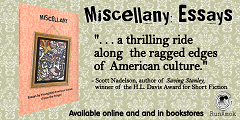Sequels
I read recently that the average person runs 60,000 thoughts through his mind each day.
And 95% of those thoughts were the same thoughts he ran through his mind the day before.
I have no data to cite here. Consider this a thought experiment.
I can believe that it’s true. True for me anyway. Can you believe it is true for you?
If you can’t believe it, try asking someone to do an impersonation of you. You might be surprised with how accurate it is. Impersonations can only exist if the person you are saying is doing or saying the same thing everyday. And if we are speaking and acting the same each day, how could our thoughts be any different?
I read of this idea in a book called The Monk who Sold His Ferrari by Robin Sharma.
There will be a new teacher in the building next year and he said he wanted to use that book in the classroom. So I read it to get a sense of how teachable it might be. Oddly enough, a lot of the best books, at least my favorite books, are not very teachable. Take Jazz, by Toni Morrison. Great book. My favorite of the many Morrison novels I’ve read. Like all Morrison novels, it is dense, braided, and brilliant. But teachable? It failed to hook my students so profoundly that I day dreamt of administering a Jazz effigy instead of a final exam.
Winter in the Blood is another example. This is one of my favorite books ever written. My students loathed it. Then I started teaching a different James Welch novel, Fools Crow. This one was very successful in the classroom, likely because of its violence and warring and hilarious banter.
After reading The Monk who Sold His Ferrari, I can foresee it being another one of these great books that is too burdensome to teach.
In Monk, a lawyer returns to his former mentor after a heart attack which sent his life on a new spiritual trajectory.
The returning lawyer shares the wisdom he gleaned from monks in a faroff temple. The idea that the way we think today is 95% replicated from the way we thought yesterday, was part of the monk’s message to his friend: enlightenment depends on imagination. This I agree with.
Thinking for oneself is a fading art. We are camping ourselves within ideological borders, losing the ability to float above our tribe to see the nature of the war we are fighting.
I’ve heard it — this floating above — referred to in recovery as levitating. If you are feeling irate in traffic because the car next to you didn’t alternate while merging, take your mind’s eye above the street. See the person in the car next to who they are. Maybe they are rushing because they are late to something. Maybe they just didn’t realize it was your turn to merge. You are both maneuvering in traffic in order to reach your destination a second sooner. Is this worth your rage? Can you step outside of yourself sufficiently to realize how silly your anger is? I can. Sometimes. It is an immense relief each time I try.
It — this mental levitating — didn’t come naturally to me. It took a lot of practice.
To be human is to crave a certain measure of predictability and routine. It is easy for us to fall into the same line of thinking we fell into yesterday, not because it is a good way of thinking, but because it is a way of thinking we recognize as safe and sound.
But we also detest boredom and sameness, which, at times, become indistinguishable from what is safe and sound.
I think that’s why sequels are never as good as the original.
Most movies draw upon certain formulas that make for good movies. We love those movies because they give us that sense of safeness without the sameness we dislike. Sequels are more difficult because the sequels follow the same formula as the original. The sequel may be a better movie, but because viewers now know the formula, it ceases to entertain. You may watch the original several times over without tiring, but the minute you see the sequel’s imitation of the original, you say, “This is no good. I’ve seen this before!”
The truth is that we want to experience new things without vulnerability. But this can’t happen. Without vulnerability, a walk on the moon can feel no different than all the simulations you practiced back at NASA.
Inversely, vulnerability allows you to experience the most mundane aspects of life as adventuresome excursions.
And this is the more profound function here. Time in prison can serve to liberate one’s mind. Take Malcolm X or Nelson Mandella as your example. By becoming aware of the way we think, we can play an active role in the rejuvenation of our minds. I’ve found this is far easier with the help of a higher power.
Think about this. Take the earlier example of mental levitation. We may be able to levitate our thoughts above the car that cut us off in traffic or the partner we are arguing with. But what if you kept going up? What if you raised your thoughts above the policies of governments and the friction of wars. What if you attempted to turn a bird’s eye view on the bird. That’s the God’s eye view, in my opinion.
You might find yourself asking, What was I so upset about again?
Then, if you’re still with me, consider how God or the spirit of coincidence or the universe or the creator or whatever term you have for that higher power has played a direct role in your life. What a power that is–to be both above the fray and in the thick of it.
No day needs to feel the same if I choose to try on a new way of thinking. And I can challenge myself on this without fear. If that new line of thinking doesn’t work out, I’ll be right back into that old way of thinking anyway, 95% of the time.

 Previous Post
Previous Post Next Post
Next Post












Mark – loved this thought provoking piece – we all get into a routine – having a routine is a good thing for a teacher, golfer, surgeon, mother, writer, etc etc – a must really – but the downside is we get enclosed in a routine in a way that prevents us from expanding our daily lives and experiences – stuck if you will – cloistered monks being the most enclosed routine I can think of – they literarily block out the outside world – I t’s good to break up the routine every so often even if it puts us in an uncomfortable place for a while – it’s like sunshine pouring in to shaded place – anyway, that’s the thought your words spurred in me –
as to mentally getting yourself above the moment – staying calm when you feel angry – well, we spend a lot of energy every day just working our way through/around the crowds of people going every which way – we have some nice tools like am/fm/satellite radio, very comfortable cars, but the strain to ambulate the daily maze can really create tension that needs to find a release – one of the joys of rewiring (what Molly calls retiring) is being able to choose when to get on that treadmill and when to get off – it’s not enrtirely within your control but enough that you can be very satisfied that you have the upper hand
Good piece my friend!
mod
Fantastic. Senior Okey, my soul mate and uncle. This is it, exactly. What you made me think of is how badly people misconstrue science and imagination and faith. Men of tremendous faith and imagination shaped modern science. And, in increasing numbers, people let science take the place of faith and imagination. We put the cart before the horse.
So what? So I’ve found imagination and faith to be what life is lived for. The more we make them unnecessary through science and technology, they less we have to live for, generally speaking.